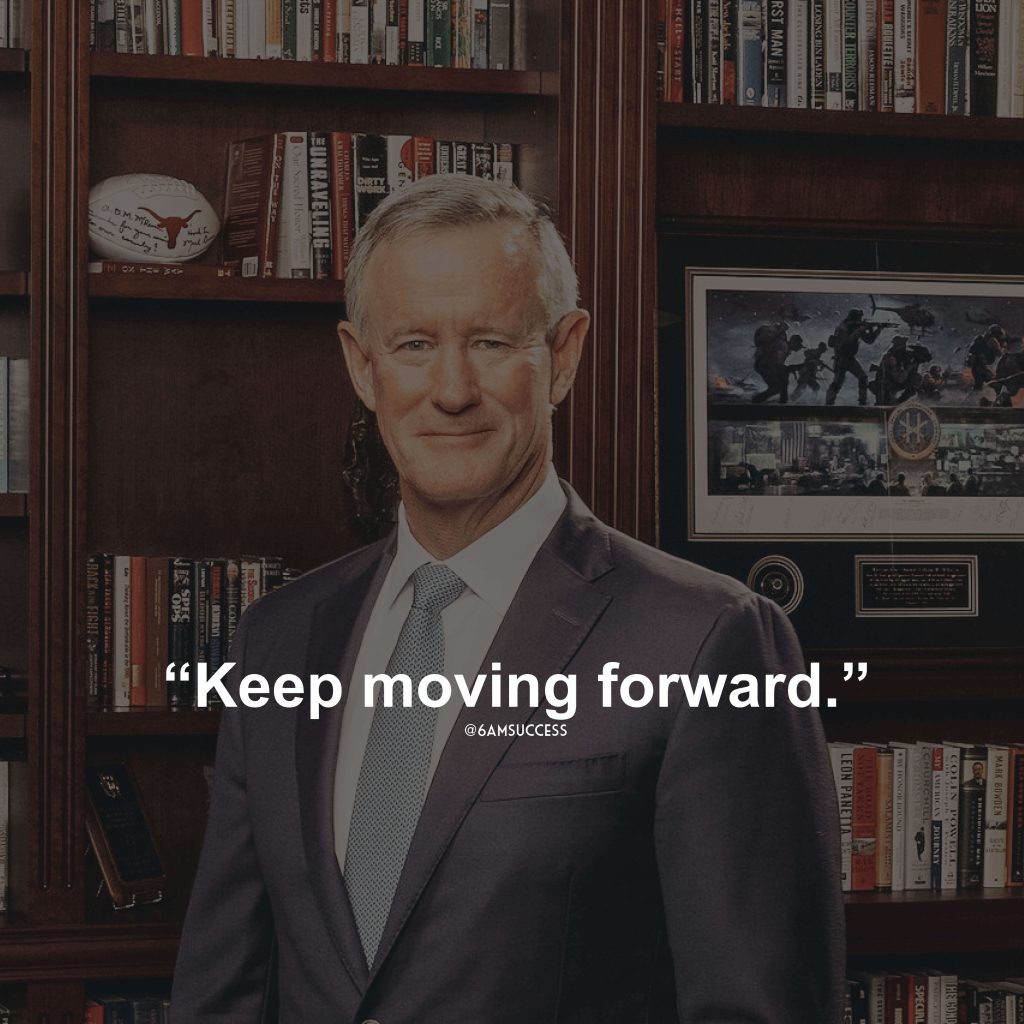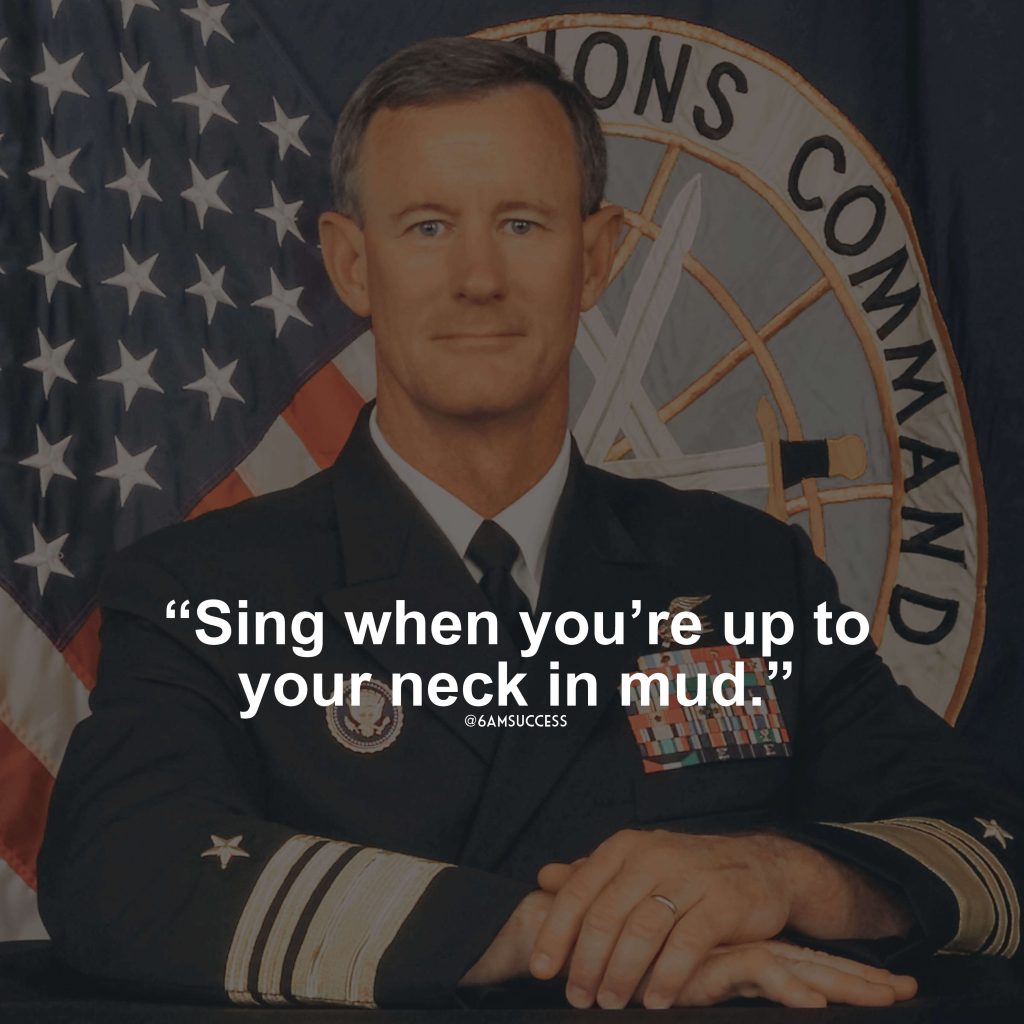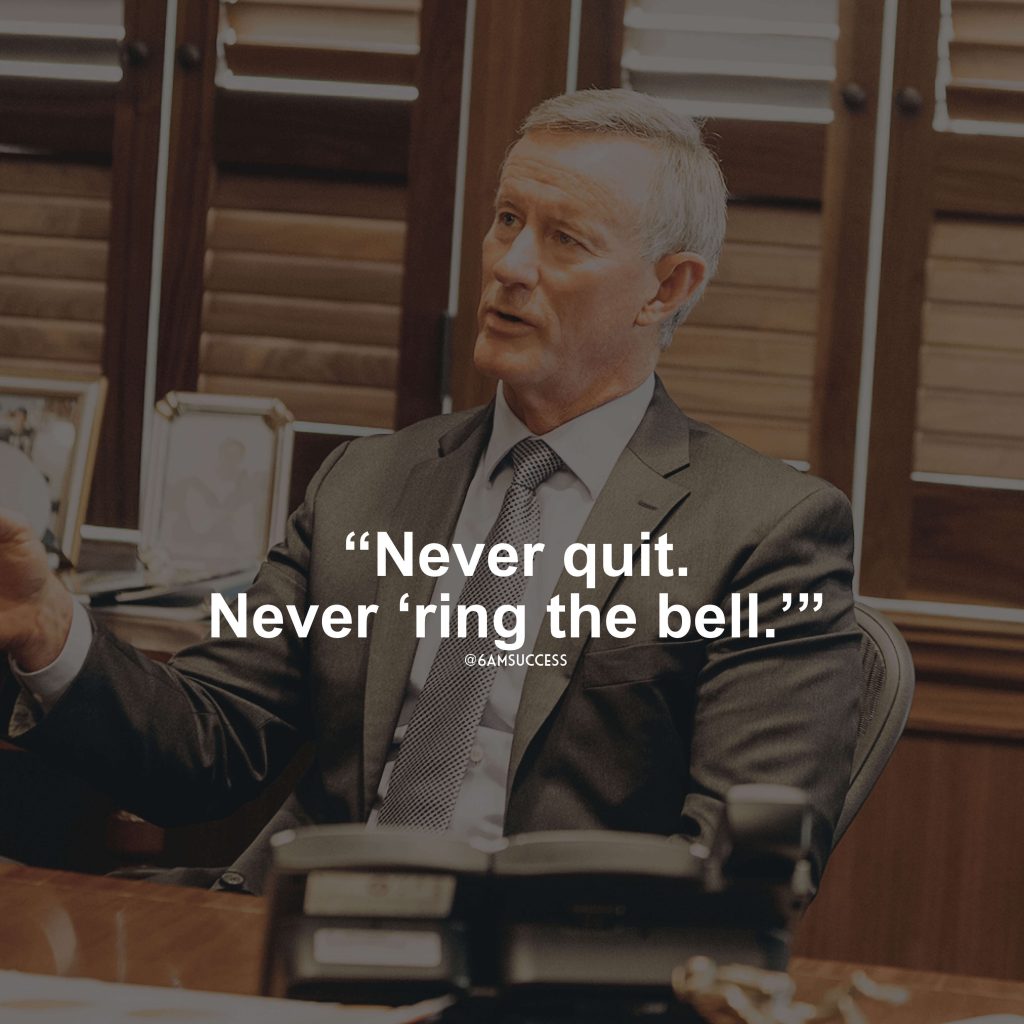“Life is a struggle and the potential for failure is ever present, but those who live in fear of failure, or hardship, or embarrassment will never achieve their potential. Without pushing your limits, without occasionally sliding down the rope headfirst, without daring greatly, you will never know what is truly possible in your life.” ― William H. McRaven
Navy Seal Admiral McRaven Speech
1. Start the day by making your bed.
Is it surprising that a four-star admiral known as the world’s deadliest man begins by telling you the same thing that your mom probably got after you to do as a little kid?
Start every day making your bed, McRaven advised, which was the first task of the day at SEAL training. If you do so, it will mean that the first thing you do in the morning is to accomplish something, which sets the tone for the day, encourages you to accomplish more, and reinforces that little things in life matter.
“And, if by chance you have a miserable day, you will come home to a bed that is made–that you made,” McRaven said, “and a made bed gives you encouragement that tomorrow will be better.”

2. Find the right people to help you.
Each day at SEAL training, the volunteers had to paddle several miles down the San Diego coast in heavy surf, using small rubber boats. Everyone had to paddle together, he said–on a synchronized count and with similar strength–otherwise the boats would “turn against the wave and be unceremoniously tossed back on the beach.”
That metaphor carries over into life, McRaven said.
“For the boat to make it to its destination, everyone must paddle. You can’t change the world alone–you will need some help– and to truly get from your starting point to your destination takes friends, colleagues, the good will of strangers and a strong coxswain to guide them.”

3. Attitude and heart can outweigh other advantages.
One of the toughest groups of guys at SEAL training was a boat crew of six men, none of whom was more than five feet five inches tall, McRaven said. The bigger students referred to them as “the munchkin crew.”
Simply enduring the training was proof of toughness–the munchkin crew was among just 35 men in the original class of 150 who stuck around–but McRaven said these smaller guys “out paddled, out-ran, and out swam all the other boat crews.”

The lesson? “SEAL training was a great equalizer. Nothing mattered but your will to succeed. Not your color, not your ethnic background, not your education and not your social status. … If you want to change the world, measure a person by the size of their heart, not the size of their flippers.
4. Keep moving forward.
Some of the most uncomfortable moments during SEAL training came when the students were punished for small infractions–having a smudge on a belt buckle during uniform inspections, for example.
“For failing the uniform inspection, the student had to run, fully clothed into the surf zone and then, wet from head to toe, roll around on the beach until every part of your body was covered with sand,” McRaven recalled. “The effect was known as a ‘sugar cookie.’ You stayed in that uniform the rest of the day–cold, wet and sandy.”
Many students couldn’t endure the pain, but the key to succeeding was to accept that sometimes, life just sucks. But you have to move forward.

5. Don’t be afraid of the circuses.
The “circuses” during SEAL training referred to remedial physical training–an extra two hours of calisthenics for failing to meet a standard during the day. Circuses were “designed to wear you down, to break your spirit, to force you to quit.”
Nobody wanted to fail at anything; nobody wanted to have to go to the circus at the end of the day, when they were already exhausted from training. As painful as it was, however, McRaven said the extra two hours of working out started to pay off. The students who were “constantly on the list … got stronger and stronger.”
Pain builds strength and resiliency, McRaven said, both in training and the real world. Don’t be afraid of it.

6. Be resourceful and innovative.
It probably won’t surprise you to learn that SEAL training included an obstacle course. One of the obstacles was called the “slide for life,” and consisted of a 200-foot rope stretched between a 30-foot high tower and a 10-foot high tower.
The record for completing the obstacle course had stood for years by the time McRaven went through. He recalled that another student in his class shattered the record, in part by racing down the slide for life head-first, instead of the slower, safer method that everyone else used.
Taking risks and being innovative often pays off.

7. Don’t back down from the sharks.
I have to admit that the idea of volunteering for something like SEAL training never would have appealed to me, and by this point in McRaven’s description of the course, I’m confident that I made the right life choice. The next training exercise he described in his speech is the “night swim,” in which students have to swim through shark-infested waters.
“They assure you … that no student has ever been eaten by a shark–at least not recently,” McRaven said. “But, you are also taught that if a shark begins to circle your position–stand your ground. Do not swim away. Do not act afraid. And if the shark, hungry for a midnight snack, darts towards you … punch him in the snout and he will turn and swim away.”
If you can face a shark alone in the Pacific Ocean, you can probably face most of life’s other sharks. Don’t be afraid of them.

8. Be your very best in your darkest moments.
Among the many missions Navy SEALs tackle is to conduct underwater attacks against enemy shipping. This involves a pair of SEAL divers swimming two miles underwater, “using nothing but a depth gauge and a compass to get to their target.”
Most of the way during the swim, at least some light can reach the depths at which the SEALs are swimming. Close to the target, however, the shadow of the ship itself blocks all the light, and the SEALs find themselves working in pitch dark, McRaven said.
“Every SEAL knows that under the keel, at the darkest moment of the mission–is the time when you must be calm, composed–when all your tactical skills, your physical power and all your inner strength must be brought to bear.”

9. Sing when you’re up to your neck in mud.
“Hell Week” is the ninth week of SEAL training. It involves six days of almost no sleep and constant physical challenges. Part of this takes place at a swampy area between San Diego and Tijuana known as the Mud Flats.
At one point in McRaven’s Hell Week, the instructors ordered the class into the freezing mud for hours, which “consumed each man till there was nothing visible but our heads. The instructors told us we could leave the mud if … five men would quit.”
Instead, one man in the group started singing. Another joined in, and then another. The instructors threatened them, but they kept singing–which made the whole exercise just bearable enough to finish.

10. Never quit. (Never “ring the bell.”)
In SEAL training, students can quit anytime–and many ultimately do. There is a brass bell at the center of the training compound, and if you decide you want out of the course, all you have to do is go up to it and ring it.
“Ring the bell, and you no longer have to wake up at 5 o’clock,” McRaven said. “Ring the bell and you no longer have to do the freezing cold swims. Ring the bell and you no longer have to do the runs, the obstacle course, the PT–and you no longer have to endure the hardships of training. Just ring the bell.”
The ultimate key to success, McRaven said, is never to ring the bell.



